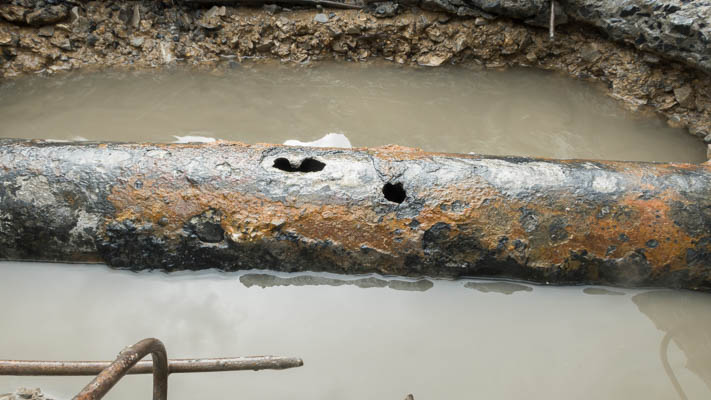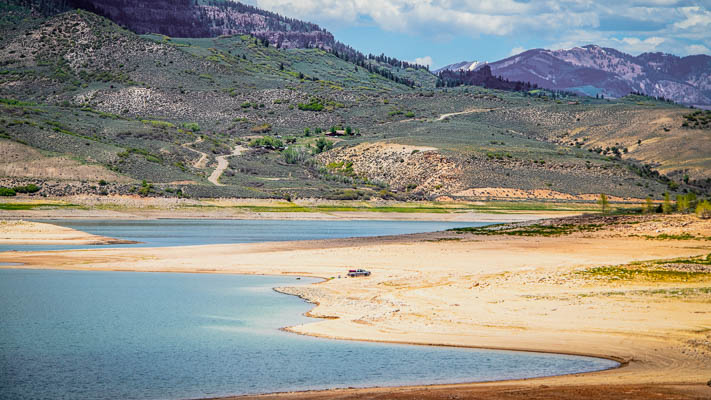What is Mountain Drought in Colorado?
Mountain droughts in Colorado are long periods of dry conditions, particularly affecting the mountainous regions of the state.
These droughts are marked by below-average precipitation levels, diminished snowpack, and limited water availability in mountainous areas, which are crucial water sources for downstream communities, agriculture, and ecosystems.
Mountain droughts in Colorado can significantly impact water resources, leading to reduced streamflow, and depleted reservoir levels, while also presenting challenges for water management in the state's mountainous regions.
How Can I Reduce Water Usage in My Colorado Home?
Amidst the challenges posed by mountain drought in Colorado, it's crucial for residents to be proactive in conserving water. Here are some effective ways Coloradans can reduce water usage in their homes:
- Practice Responsible Water Habits: Adopt simple water-saving habits such as turning off the tap while brushing teeth, promptly fixing leaks, and only running dishwashers and washing machines with full loads. Water Education Colorado have a list of 22 easy ways to help save water in your Colorado home.
- Collect Rainwater: Install rain barrels or cisterns to collect rainwater runoff from your roof. This harvested water can be used for watering outdoor plants, reducing the need for treated tap water.
- Install Smart Irrigation Systems: Invest in smart irrigation controllers that adjust watering schedules based on weather conditions and soil moisture levels. These systems ensure that your lawn and garden receive the right amount of water, reducing unnecessary usage. Additionally, consider xeriscaping techniques, such as planting native drought-resistant plants, to minimize outdoor water needs. A Cut Above Landscape provides smart irrigation systems that best suit your Colorado home.
- Upgrade to Water-Efficient Fixtures: Replace old, inefficient toilets, faucets, and shower heads with WaterSense labeled models. These fixtures are designed to minimize water wastage while maintaining performance.
- Fix Leaks Promptly: Conduct regular inspections of your plumbing system to detect and repair leaks promptly. Even small leaks can lead to significant water wastage over time while causing unseen damage to your home. Pay attention to signs of leaks such as unusually high water bills, damp spots, or the sound of running water when no fixtures are in use.
If after implementing these measures your water usage remains unexpectedly high, it could indicate a hidden systemic issue in your home's plumbing system. It is important to tackle the issue promptly to ensure that you effectively save water during Colorado's extended periods of drought.
How Does Aging Infrastructure Impact Water Loss in Colorado?
Aging infrastructure poses a significant challenge to water conservation efforts in Colorado, especially as outdated plumbing materials in older homes can contribute to water loss.
Materials such as galvanized pipes, which were commonly used in older Colorado homes, are prone to corrosion and deterioration over time, further contributing to water leakage. For more information about galvanized pipes, you can read our article Should I Replace My Galvanized Plumbing?

Addressing the effects of aging plumbing infrastructure is integral to minimizing water loss in your Colorado home during periods of drought. If you are experiencing plumbing failures from old galvanized pipes, it's important to consider a full home repipe, ensuring the longevity of your home's plumbing for many years to come.
Contact us to have one of our local repipe consultants provide a free consultation and quote, delivered in-home or remotely.
Get your free estimate today
With over 75,000 repipes completed, we've perfected our One-Stop Repipe™ for your home.
What Are the Best Plumbing Materials for Water Conservation in Colorado?
In Colorado, especially during prolonged drought periods, selecting the right plumbing materials is crucial for effective water conservation efforts.
PEX (cross-linked polyethylene) tubing emerges as the best material due to its versatility and durability. PEX pipes are resistant to corrosion and freezing, making them well-suited for the state's diverse climate conditions, including freeze-thaw cycles common in mountainous regions.
Additionally, PEX is flexible and easily maneuverable, simplifying the installation process and minimizing the risk of leaks compared to rigid materials like galvanized steel. This inherent flexibility also allows for fewer joints, reducing the likelihood of potential leakage points. You can learn more about PEX in our article Is PEX a Good Choice For Repiping?.
Here at Repipe Specialists, our full home repipes (it's all we do) will eliminate any concerns you have about your home's aging freshwater lines compromising water conservation during Colorado's drought periods. Our repipes are typically completed in as little as one day, with a return visit on the second day for wall patching if needed. We handle everything, including permits and inspections.
With our expertise and PEX's reliability, Colorado homeowners can have peace of mind knowing their plumbing system is optimized for water conservation and resilience against the challenges of mountain drought.
Get a Quote for Repiping Your Home.
Here at Repipe Specialists, we've fully replaced the plumbing in thousands of homes since 1991 with PEX tubing. We continually get positive customer feedback from customers about their overall home repipe experiences. We often exceed their expectations on:
- Speed: Our repipe crews typically complete a repipe in a day, returning on another day for wall patching.
- Convenience: Through our One-Stop Repipe™ Process, we handle everything from permits, to wall patching, to inspections.
- Cleanliness: Our crews are trained to protect your home while working (we cover all surfaces with protective sheeting), and to clean up fully at the end of each day.
- Peace of Mind: Repipe Specialists is a fully licensed plumber in every state we operate in, and we back all of our repipes with a lifetime warranty.
- Financing programs: To help take the sting out of unplanned repipe expenses, we offer several financing programs.
- Price: As a specialist that performs hundreds of repipes a week, we can deliver high quality repipes at a lower cost vs generalist plumbers. We have an article that cover repipe cost factors in detail. Our quotes typically range from $4,500 to $15,000 depending on the size and complexity of your project.
Schedule a free in-home consult, and one of our local repipe consultants will explain all your repipe options and provide you with a written, fixed-price quote. Beat Colorado's mountain droughts, repipe with PEX.

